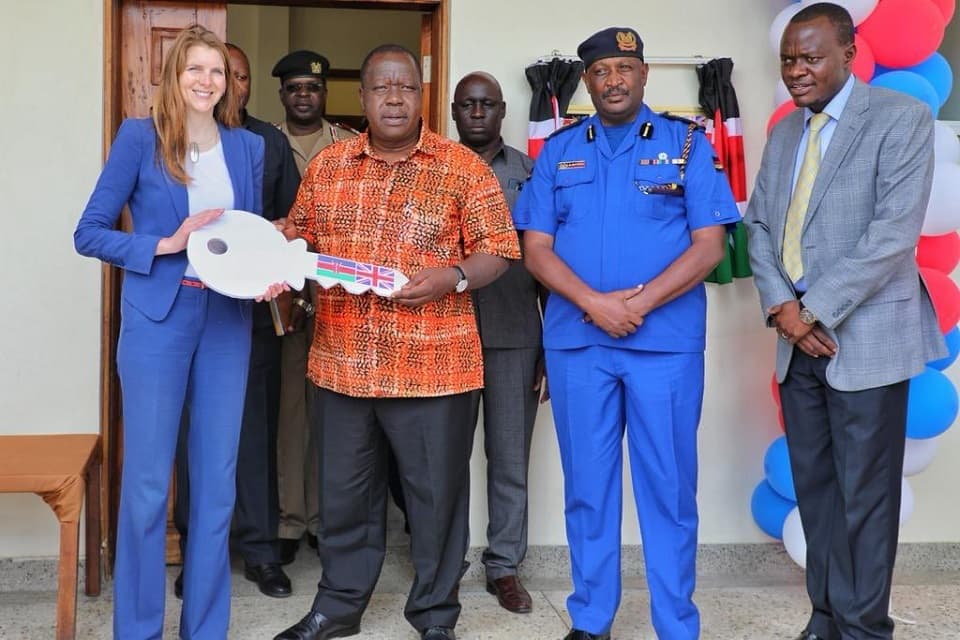We're loading the full news article for you. This includes the article content, images, author information, and related articles.
An investigation into alleged Chinese state pressure on a British university has been referred to counter-terrorism police, involving research that identified Kenyan garment suppliers in supply chains tainted by Uyghur forced labour.

LONDON, UK – British counter-terrorism police have launched an investigation into allegations that Sheffield Hallam University halted critical human rights research following pressure from the Chinese government. The case was referred to law enforcement by South Yorkshire Police, who cited potential offences under Section 3 of the UK's National Security Act 2023, which deals with assisting a foreign intelligence service, according to a police spokesperson's statement on Monday, 3 November 2025.
The controversy centres on the work of Professor Laura Murphy, an internationally recognised expert on human rights and contemporary slavery at the university's Helena Kennedy Centre for International Justice (HKC). In February 2025, the university ordered Professor Murphy to cease her research into forced labour within China's Uyghur Region and its links to global supply chains. The university has since apologised to Professor Murphy in October 2025 and lifted the restrictions, stating the initial decision was based on a complex situation, including the inability to secure professional indemnity insurance for the work.
Documents and internal emails suggest the university's decision followed a campaign of intimidation. According to reports, staff at Sheffield Hallam's Beijing office were questioned by Chinese state security officers who made it clear the research should stop. Subsequently, the university's websites were blocked in China, impacting student recruitment. An internal university email from July 2024 noted that retaining business in China and publishing the research had become "untenable bedfellows." Professor Murphy alleged the university was "explicitly trading my academic freedom for access to the Chinese student market." The university denies the decision was based on commercial interests.
Professor Murphy's research has been influential, cited by governments in the US, UK, and EU to shape policies against forced labour. Her team has published extensive reports on supply chains in the apparel, solar, automotive, and critical minerals sectors connected to the Uyghur Region. The Chinese government consistently denies all accusations of forced labour, stating its policies in the region are for poverty alleviation.
Crucially, the very research at the heart of this international controversy has direct implications for Kenya. A landmark 2021 report by Professor Murphy's team at the Helena Kennedy Centre, titled "Laundering Cotton: How Xinjiang Cotton is Obscured in International Supply Chains," explicitly identified Kenya as part of the global network potentially tainted by forced labour.
The report detailed how cotton from the Uyghur Region, which accounts for a significant portion of global production, is processed and spun into yarn and fabric by major Chinese manufacturers. This material is then exported to garment factories in numerous countries to be sewn into clothing for major international brands. The investigation identified 53 contract garment suppliers across ten countries, including Kenya, that purchase fabric and yarn from these Chinese companies. This process effectively "launders" the cotton, obscuring its origin from consumers and regulators.
The findings place Kenya's growing apparel and textile sector, a key pillar of the nation's manufacturing agenda, at high risk of complicity in one of the world's most severe human rights crises. For Kenyan manufacturers supplying global brands, the presence of Xinjiang cotton in their supply chain represents significant legal, financial, and reputational risks, particularly concerning import regulations like the US Uyghur Forced Labor Prevention Act (UFLPA), which bans goods from the region unless proven otherwise.
The incident at Sheffield Hallam has ignited a fierce debate in the United Kingdom about academic freedom and the influence of foreign powers on university campuses. A 2019 report by the UK parliament's foreign affairs committee had already warned of "alarming evidence" of Chinese interference in British universities. The National Security Act 2023 was introduced to provide new tools to combat espionage and foreign interference, with the offence of assisting a foreign intelligence service carrying a potential sentence of up to 14 years in prison.
For Kenya and other nations integrated into global manufacturing, this case serves as a stark reminder of the complexities within international supply chains. As the government aims to expand the domestic cotton and apparel industry, ensuring ethical sourcing and robust due diligence will be paramount to maintaining access to key export markets and upholding international human rights standards. The investigation continues, with its outcome poised to have significant ramifications for academia, international relations, and corporate responsibility worldwide.
Keep the conversation in one place—threads here stay linked to the story and in the forums.
Other hot threads
E-sports and Gaming Community in Kenya
Active 9 months ago
The Role of Technology in Modern Agriculture (AgriTech)
Active 9 months ago
Popular Recreational Activities Across Counties
Active 9 months ago
Investing in Youth Sports Development Programs
Active 9 months ago